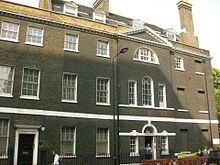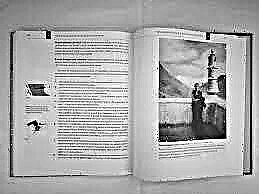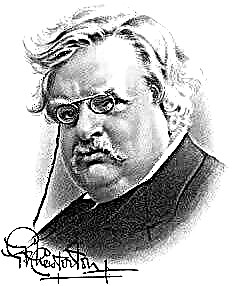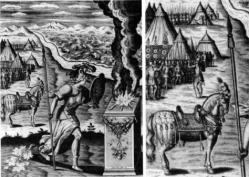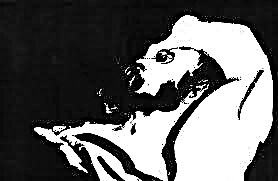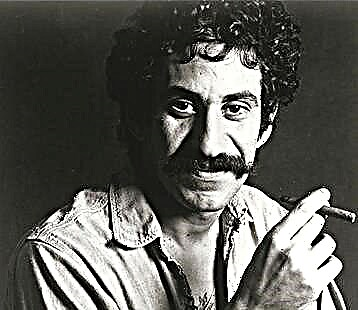: Grandfather sends his grandson to work with strangers. The boy suffers beatings and bullying, his life is dirty and boring. Having matured, he feels a craving for reading and science, and decides to go to study.
The narration is conducted on behalf of the boy Alyosha Peshkov.
I
Grandfather Vasily arranged Alyosha as a “boy” in the Nizhny Novgorod shoe store, where his cousin Sasha Yakovlev had already worked. Alyosha had to open the doors to customers and carry out various small assignments. The boys lived in the house at the store where the cook was running, “a sick and angry woman”, which forced Alyosha to help with the housework - to clean shoes, bring water, put a samovar.
Sasha used his seniority and the position of assistant clerk, in every possible way poking and commanding Alyosha, although he was taller and stronger. Accustomed to the will, the boy was painful to be in the store all day. He was disagreeable with the owner, a quiet man with bright, as if blind eyes, and a senior clerk, tidy and somehow slippery.
Many times Alyosha saw the landlord and the clerk courting the customer, and then "talking about her dirty and shameless." In addition, Sasha and the clerk robbed the owner, hiding shoes in the chimney. Alyosha remembered the landlord’s promise to imprison him for theft, and this very frightened him.
Sasha did not like the cook, a strange woman who liked to watch fights, considered her a witch and constantly tried to get Alyosha to arrange some dirty tricks on her. One morning, the cook died right in front of the boys. This frightened Sasha so much that he brought Alyosha close to him, showed him his chest, stuffed with buttons, pins and other trifles collected on the street, and a cache under the root of the tree where a small chapel was arranged. In the middle of the chapel stood a coffin with a sparrow, which Sasha himself had killed.
Sasha’s “treasures” aroused “painful surprise” in Alyosha. The boy ruined the “Chapel" when Sasha compared it to his dugout, where he had once lived all summer, hiding from his stepfather. After that, Sasha began to do nasty things to his brother - he smeared his face with soot when he was sleeping, and put needles in the shoes that he was cleaning.
Alyosha decided to run away “from all this boring, stupid life”, but on the evening before the escape he scalded his hands with boiling cabbage soup and ended up in the hospital, from where he was taken home by Akulin’s grandmother, Kunavino settlement.
II — III
Grandfather met Alyosha awkwardly. He gave all the money he had left to his nephew “in growth”, but did not receive it back and became even more greedy. Grandmother believed that he did little to help the poor, from this and all the misfortunes. Now she tried “gentlemen to appease a bit” and at night gave out “quiet alms” - she placed on the windowsills of other people's houses a penny and a pair of pretzels.
At home, nothing has changed. Grandfather was still cursing with his grandmother, and Alyoshin, brother Kolya, gray and listless, was sleeping in a linen basket. Alyosha's friend, the black-eyed Kostroma, said that he and Churka fell in love with a new neighbor, a beautiful girl on crutches, and now they often quarrel.
The lame girl Lyudmila at first did not like Alyosha because of her painful fragility, but soon he also began to strive to see her as often as possible. Kostroma, Churka and Alyosha competed with each other for Lyudmila's smile, often to tears and fights. The girl chose Alyosha as a friend. They often sat in the waiting room, read aloud a novel completely incomprehensible to the boy, or talked.
Soon, Lyudmila's mother found a job, in the afternoon the girl was left alone, and Alyosha began to visit their apartment often, to help with the housework. When grandfather was not at home, they went to their grandmother to drink tea. Once Alyosha, with a grandmother's blessing, spent a night arguing on the grave of a recently deceased old man, after which he became a "hero" of the street.
One morning Alyoshin's brother Kolya died quietly. He was buried in the grave of Alyoshin's mother. The boy saw the black, rotten boards of the mother’s coffin, for a long time he could not forget what he saw, and told Lyudmila about this. The girl remained indifferent - she wanted to become an orphan in order to freely go to the monastery. After that, Alyosha lost interest in her.
All summer Alyosha and her grandmother were selling mushrooms, berries, nuts and medicinal herbs collected in the forest. In autumn, grandfather sent Alyosha to the family of Matryona's grandmother's sister, who lived in Nizhny Novgorod. Her eldest son, who worked as a draftsman, promised to take the boy as a student and pay grandfather six rubles a year for him.
IV
Matryona's family lived in a two-story apartment building, standing by a dirty ravine. Her eldest son, the owner, was a kind man, the youngest, Victor - a parasite and a loafer. The owner was married to a magnificent pregnant woman. The owner liked Alyosha and reminded him of his old friend Good Deed.
The family lived unhappily. Matryona, “a noisy, indomitable angry old woman,” constantly quarreled with her daughter-in-law and furiously asked God to punish her. She loved Victor blindly and frantically and constantly begged for money from him for the elder.
Relatives relate to each other worse than strangers: more than strangers knowing something thin and funny about each other, they gossip more angrily, often quarrel and fight.
Here they loved to eat and discuss neighbors a lot - they and Matryona and her daughter-in-law were judged "ruthlessly and mercilessly." Nobody was going to teach Alyosha a drawing craft. For days the boy was busy with household chores under the command of Matryona's grandmother. Alyosha worked willingly - he liked to destroy the dirt - but he could not stand the owners, he was impudent and rude with them.
Soon, the owner nevertheless began to teach Alyosha, but Matryona struggled to interfere with these lessons, and they quickly stopped. It was a pity for the grandmother that the son was teaching not a brother, but a stranger boy. Victor did not like the boy, he often beat and scoffed at him.
In the courtyard of the house stood an outbuilding where officers and their orderlies lived. The yard was seething with life, full of bestial depravity and senseless cruelty. The hosts discussed all this in detail at dinner, and Alyosha was unbearably disgusting to listen to them.
Sometimes a boy was visited by a grandmother. Matryona took her sister at the doorstep as a beggar, and for a long time she "sawed and scratched her grandmother with her indefatigable tongue," but the landlord and his wife received Akulina respectfully, for which Alyosha was deeply grateful to them.
Alyosha was released from the house only on Saturdays and holidays, to church. He liked the church, but on quiet nights he walked the service and staggered around the city, looking out the windows of the houses.
In spring, Alyosha became addicted to grandmother, ball and town games, lost the money that was given to him for a candle, and soon became known as the most skilled player on the street. In this he had to confess to the priest, but Alyosha’s sins were not impressed, he only wondered if the boy had read the forbidden literature. These “forbidden books” interested Alyosha very much.
Spring came. Alyosha became even more disgusting to engage in other people's households and observe “dog weddings” in the courtyard.
V — vi
Easter field Alyosha escaped. He was ashamed to return to his grandmother in Kunavino, and the boy got a dishwasher on the Dobry steamer, which carried barges with prisoners along the Volga. Passengers on the boat - “quiet loafers” - stained a lot of dishes, and Alyosha washed it from six in the morning until midnight.
In the steamer kitchen, the cook was commanded by Smuriy, fat and huge as a bear. Alyosha quickly realized that Smuriy was a kind man, albeit a drunkard. The boy did not like the rest of the kitchen staff. When they started talking dirty about women, Smuriy led Alyosha into his cabin and made him read aloud incomprehensible books without a beginning or an end. He believed that the whole mind is in books, and to understand them, one must read more than once.
Soon Smuriy and Alyosha began to take good books from the captain's wife and became addicted to reading.The cook forced the boy to read, and entrusted his work to the senior dishwasher Maxim, for which the pantry servant did not like Alyosha and did everything to him in every possible way.
Once, a “red-breasted woman with a girl” boarded a steamer, drunk and accessible. At night, Alyosha’s enemies dragged him into the cabin to these women - “marry”, but Smuriy repulsed the boy. In the morning, the captain found in a cabin with the women of Maxim and put all three ashore. The hunchbacked waiter Sergei, obsessed with women, was to blame for “mischief”, and Alyosha felt sorry for the kind and serious Maxim.
In place of Maxim took a skinny soldier, inept and helpless, over whom not only the steamship servant, but also the passengers began to cruelly mock, and almost brought the unfortunate to suicide. Alyosha did not understand where so much cruelty came from in people.
Quiet, timid and sadly submissive is noticeable in people first of all, and so strange, scary, when cruel, senseless and almost always gloomy mischief suddenly breaks through this bark of humility.
One night, something burst in the engine room, the deck was clouded with steam, the passengers decided that the ship was sinking, and panic began. Alyosha first watched how previously intelligent people turn into a herd maddened by fear. And besides this, there was a lot of things that did not allow the boy to understand whether they were evil people or good people.
It soon became apparent that Sergei was stealing and selling cutlery. Alyosha was suspected of conspiring with him and fired.
VII
Alyosha returned to his grandmother and grandfather, who moved from the settlement to Nizhny Novgorod. The boy engaged in catching songbirds, and his grandmother sold them at the bazaar. This occupation fed them until late autumn.
Opposite the new house, there was a vast field where soldiers trained. Alyosha ran along with the soldiers, and it seemed to him that there were no people better than them, until the young Unter gave him a joke for the sake of a cigarette stuffed with gunpowder. Then the boy began to run into the barracks of the Cossacks. Once he saw a Cossack, who sang better than anyone and seemed to the boy a "fairy-tale creature", raped a woman. "Petrified by amazement and a bitter, longing feeling," Alyosha thought that this could happen to his grandmother or mother.
VIII — IX
In winter, grandfather again took Alyosha to his grandmother Matryon. Over the summer, the boy grew up, matured, but here nothing has changed. The owners were still full of pain in their stomachs and nasty gossip. Alyosha talked about his service on the ship, but the narrow-minded women did not believe him. The owners were afraid of books and were sure that reading was very harmful.
Now the house had two young children, and Alyosha worked even more. Every week, he went to rinse his clothes to a small stream, where the laundresses gathered from all around. Most of all, Alyosha liked "Natalia Kozlovskaya, a woman in her late thirties, fresh, strong, with mocking eyes, with some particularly flexible and sharp tongue." Other laundresses respected her for her capacity for work, accuracy, and for sending her only daughter to go to school.
Listening to the conversations of women, Alyosha was surprised at how shamelessly they talk about themselves. The laundresses spoke evil and mocking about their novels and men, and the boy felt that Matryona’s grandmother was right when she said that “the woman is power”.
In addition to the laundresses, Alyosha met with orderlies Ermokhin and Sidorov. Ermokhin was a kind man, but he treated women “like a dog’s rude and simple.” He deceived them, arousing self-pity, believed that a woman wants to be deceived, and everyone lies in this “shameful affair”.
In one of the apartments of the house there lived a cutter, a non-Russian man, childless, with a small, quiet wife who "read books day and night." The officers who lived in the house decided to play a trick on the cutter - they began to write love letters to her and laugh at her answers. Unable to stand, Alyosha told the woman the truth. Thus began their acquaintance.
The cutter gave the boy a thick romance, which he carefully hid from his masters and read at night.Awakened passion for reading brought Alyosha a lot of "heavy humiliation, resentment and anxiety."
Since New Year, the owner wrote out the “Moscow Leaf” and in the evenings Alyosha read aloud the novels printed there - “literature for the digestion of people killed to death by boredom.” There wasn’t enough newspaper for the evening, and the boy suggested reading the subscriptions “Spark” and “Picturesque Observation” lying under the bed — the owners wrote out these magazines for the sake of the reproductions of paintings attached to them.
Thanks to these magazines, the boy learned about other countries and cities. Many words were incomprehensible to him. Their meaning was explained to Alyosha by a pharmacy pharmacist who "had keys to all secrets."
Words, ‹...› it is like leaves on a tree, and to understand why a leaf is such and not another, you need to know how the tree grows - you need to learn!
During Great Lent, cathedral bells began to ring and it became known that the king was killed. For what - Alyosha did not understand, it was forbidden to talk about it.
Soon, an unpleasant story happened with Alyosha - the master's child released water from a boiling samovar, it fell apart and fell apart. Grandmother Matryona beat the boy with a bunch of pine torch, which left many splinters under her skin. Alyoshin’s back was swollen, and he was taken to a doctor, who suggested that the boy draw up a report on the torture. Alyosha did not complain, and for this he received permission to take books from the cutter.
Alyosha began to read thick adventurous novels, but soon noticed that despite the variety of subjects they are very similar - in all, virtue defeats evil. The dissimilarity of the life described on the pages of the novels with reality made the boy doubt the veracity of the novels. He wanted something else, real, and he often recalled "forbidden books." They talked about the cutter in the yard worse, she soon left, and her husband changed his apartment.
X — XI
Even before the cutter left, a young beautiful aristocrat with a small daughter and an old mother settled in the house of Alyoshin's owners. For the beauty and regal posture, the boy called her to himself Queen Margot. Alyosha often played with her daughter. Queen Margot wanted to give Alyosha money, but he asked for some book. The lady began to give the boy good books and often said that he needed to study.
Home work for Alyosha increased. Now he was not only a maid and an “errand boy”, but also helped the owner, who received a contract for the restructuring of the shopping arcade at the fair and worked from morning to night.
In the courtyard they spoke of Queen Margot “as badly and viciously as a cutter,” but more carefully, the woman was “the widow of a very noble man.” It was hard for Alyosha to hear dirty gossip about her, and the inhabitants of the house disgusted him.
Observing people's vices is the only fun that you can use for free.
Once a boy told Queen Margot what they say about her in the yard. It turned out she knew about gossip, but did not attach any importance to them. In gratitude for pure love, Queen Margot allowed Alyosha to come to her at any time and talked with him for a long time.
Queen Margot was going to arrange Alyosha somewhere to study, but did not have time. On the Trinity Ermokhin beat Sidorov's head with logs, and the boy looked after him all day. The next day, he found Sidorov’s empty wallet in the barn, and he accused the boy of stealing money. The owners, who saw Alyosha talking with the laundress Natalya Kozlovskaya, decided that he had stolen money to pay her for his intimacy, and severely beat the boy.
The rumor of theft has spread throughout the house. Natalya saved the boy, who said that it was not Alyosha who offered her the money, but Ermokhin, who stole the wallet. After lying down, Alyosha left home. He did not have the courage to say goodbye to Queen Margot.
All summer Alyosha served as a kitchen worker on the Perm steamer. The most interesting person here was fireman Yakov Shumov, an unusually voracious person who constantly told all sorts of funny tales about himself.Alyosha, he resembled a Good Deed, but the boy was repelled by "his thick ... indifference to people."
XII — XV
In late autumn, Alyosha “entered the apprentice as an apprentice”, but soon the mistress, an eternally drunken old woman, sent him to work as a “boy” in the shop where the icons were sold. The boy was to lure buyers to the shop - Old Believers from the Volga region. Often old people and old women brought old icons and books for sale. The clerk, along with the commander Pyotr Vasilyevich, shamelessly deceived them, buying valuable things for a penny.
Peter Vasilievich, a connoisseur of old-printed books and icons, was an intelligent man, knew "all the secrets of merchants, officials, priests, philistines." Often other superiors gathered in the shop and had long debates and discussions on religious topics.
In the evenings, Alyosha sat in the icon-painting workshop - a large basement. Icons painted on the conveyor: one master made the background, the other - the faces, the third planed boards, another primed them. Such a craft was boring and did not interest anyone. Alyosha fell in love with the people living and working there and made friends with his student Pasha Odintsov, who was two years older.
In the mornings, Alyosha prepared a samovar, tidied up a workshop, ran to a shop, mixed paints. In the evenings, the boy told the masters about his life on ships or read in history books. Soon, she and Pasha began to stage whole performances, which amused and entertained icon painters, saving them from a dreary, closed life. Gradually Alyosha took the place of storyteller and reader in the workshop.
The fun with us never lives and is not valued in and of itself, and it is deliberately lifted from under the hood as a means of tempering Russian sleepy longing.
Alesha’s workshop turned thirteen years old. The young store clerk disliked the boy. He was supposed to marry the niece of a childless widow mistress and already felt like the owner of a workshop.
The clerk found fault with Alyosha, knocked him out to steal, and the boy was about to run away to Astrakhan, and from there to Persia, but one spring he met his former master, his grandmother's nephew. He said that this year he had a lot of contracts, he called Alyosha as assistants and promised that he would no longer be a servant.
Alyosha could not return to his grandmother - an unemployed grandson and a granddaughter escaping from a cruel husband were sitting on her neck, and grandfather quietly went crazy. The boy accepted the offer of the owner. In the icon painting workshop, he served for three years.
XVI — XVIII
Nizhny Novgorod shopping arcade stood in a lowland. Every year they were flooded, and then rebuilt. Alyosha became a foreman, made sure that the workers performed their duties and did not steal too much.
Now Alyosha spent all day at a construction site, and Matryona’s grandmother no longer forced him to help with the housework. Queen Margot left long ago, now a large family lived in her apartment - five daughters and two gymnasium sons. They gave Alyosha books in abundance.
The owner had so much drawing work that he invited the assistants of Alyoshin's stepfather, an aristocrat, dying of consumption. He called the boy by name and patronymic, and soon a "cautious and obscure relationship" was established between them. The family members were senselessly hostile to their stepfather, and this brought Alyosha closer to him.
My stepfather also believed that Alyosha needed to learn.
In the presence of character - the school brings up well. Life can only be moved by very competent people.
By the end of summer, my stepfather had slept and in August died in a hospital ward in front of Alyosha. The boy failed to come to his funeral.
Among the workers managed by Alyosha there were also interesting people. The boy knew them before - on Sundays they came to the owner for payment. Alyosha was given little money for food, he was always hungry, and the workers invited him to have dinner with them. Often the boy stayed in one of the artels for the night and had long conversations with the men.
The most complex and incomprehensible Alyosha seemed Osip, a gray-haired, noble old man, the head of a carpentry artel.The workers respected him, but warned the boy that with a cunning old man, one should be careful and not trust him too much. Later, Alyosha found out that Osip passed on to the owner every word he said.
Among the workers there were honest, pious people, but all of them were broken by a gray, impoverished life, full of drunkenness and debauchery. Alyosha was especially struck by the fate of the mason Ardallon, the best worker in the artel. In the spring, he was planning to leave for Siberia to build a church under the supervision of his son-in-law, but he suddenly went on a walk, spent everything he earned on indecent girls and became a pauper by spring, settled on Millionnaya Street, where tramps huddled.
Alyosha visited Ardallon until Osip informed the owner that the boy was too often on Millionnaya Street. Alyosha began to go there secretly and once met the laundress Natalya Kozlovskaya. This once strong and intelligent woman went down, drank, worked as a prostitute because her only daughter abandoned her. After graduating from high school, she began to be embarrassed by the mother laundress and left "to be a teacher" to her rich friend. Alyosha saw Ardallon beating Natalia only because she was “walking,” and stopped going to Millionnaya.
XIX
In winter, there was no work at the fair, and Alyosha returned to his household duties, and in the evenings he again read aloud to the owners. The owner became quiet and thoughtful. Once he admitted to Alyosha that he fell in love with a woman whose husband was convicted of counterfeiting. To go to Siberia for him, money was needed, the woman earned by selling herself, and soon left for the settlement after her beloved husband.
Alyosha served as a foreman for three summers. He was tired of constant theft, deception, life seemed "incoherent, absurd" and stupid. Alyosha could talk only with Osip, but could not understand “what he loves, what he hates” and soon began to feel hostility to the cunning and indifferent old man.
Life has become like an autumn forest - mushrooms are already gone, there is nothing to do in an empty forest, and it seems that you know it through and through.
Fifteen-year-old Alyosha felt old and tired of the experience. It seemed that two people lived in it: one dreamed of a quiet, solitary life, the other was always ready for battle.
Once Alyosha met his uncle Jacob. He went broke, skipped everything and for some time served as an assistant to the caretaker at the prisoners. He was deprived of his place due to the fact that he let some prisoners go for a walk. Now he lived with his son, the soloist of the church choir, and performed the duties of a footman under him.
Uncle was also overwhelmed with indifference, and his speeches confused Alyosha even more. On the same day, he made a decision and left for Kazan in the fall, hoping to settle down to study there.

